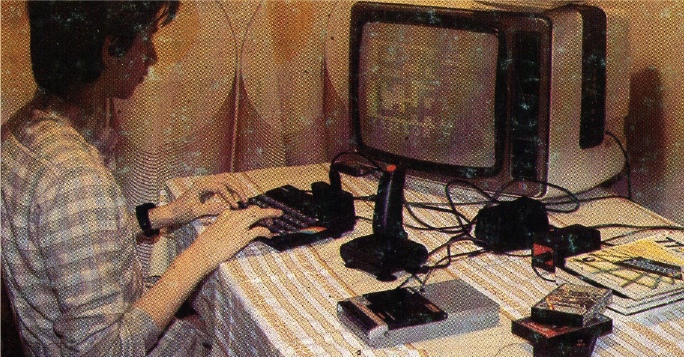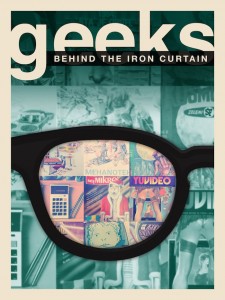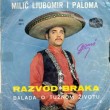Kristian Benic’s book digs out an impressive bulk of geeky stories not just about Commodores and Spectrums, but the Socialist Federal Republic’s very own futuristic endeavours
While the Soviets were preoccupied with expanding their nuclear arsenal and launching dogs into outer space, scientists in socialist Yugoslavia were quietly advancing technology by building the first pocket calculator in Europe. The db800, made by Digitron in the Istrian town of Buje, briefly placed Yugoslavia in the same elite camp as the United States and Japan, the only other countries in the world that had developed pocket calculator technology at the time.
Kristian Benic’s Geeks Behind the Iron Curtain, available as an app for $3.99 at the Apple Store or as a Kindle Book, resurrects an impressive bulk of stories like this one. Benic’s book makes it clear that Yugoslavia enjoyed a unique proto-“geek” culture, distinct from those emerging in both the Eastern Bloc and the United States. Yugoslavia was a relatively “soft” form of semi-decentralized socialist dictatorship, and this made it easier for the earliest of adapters to experiment with all kinds of things out of reach of citizens in other communist countries.
As Benic tells me over in an email correspondence, “in the eighties we could travel to Italy and easily smuggle computers like the Commodore and Spectrum”, a venture that was much more difficult to achieve in the Soviet Bloc countries. Benic also notes that the mood of the time may have differed from that of other communist countries, contributing to what would later amount to a flourishing sci-fi, comic book, and tech scene.
“Before the Second World War, Yugoslavia was one of the poorest European countries, and after the war there was a boom, boosted not only by foreign financial help and German war reparations, but with a unique optimistic spirit that emerged in those years.”
As in the West, entertainment often came with ideological messages. Benic says that sci fi in particular was used for propaganda purposes. “For example, there were many stories about robots and promises that people in the future will work only four hours a day. That wasn’t just literature but a utopian communist promise to the working people!” From today’s vantage point, in which unemployment exceeds 25% in some parts of the former Yugoslavia, working four hours per day remains something of a utopian idea.
For this reason, there is something endearing and even slightly sad about Benic’s book. One gets the sense that the cultural and technological output showcased in “Geeks” has stalled since Yugoslavia ceased to exist. While in the West we can enjoy retro computer graphics and imagine them as existing on a continuum ending with today’s modern technology, the aesthetics of domestic computing and science fiction in the countries of the former Yugoslavia belong wholly to the past.
As Benic noted in an email, “We don’t have the kind of publications for smart kids or adults anymore. The most tragic thing is that we also destroyed the culture of creating stuff in schools, we don’t have makers manifestations, and sadly too many competent people are leaving ex-Yugoslavian countries. They are mostly ‘geeks’ because they can find jobs in computer and creative industries anywhere in the world.”
Benic’s exhaustive and thoroughly researched book was born in part out of his experience writing for Plan B, a magazine he describes as a kind of Croatian Wired. While the market for Plan B was weak and the publication eventually folded, Benic seized the opportunity to construct a book dedicated to Yugoslavia’s geek culture. Since its release, Geeks Behind the Iron Curtain has attracted international attention, netting Benic an interview with the BBC.
This summer, Benic’s hometown of Rijeka will play host to Share Conference, a part of the city’s Republika Festival, which will be held on the decommissioned Yugoslav “Peace Ship” Galeb. For “geeks” from the former Yugoslavia and beyond, Benic sees this as an excellent opportunity.
“This is a very exciting moment for Rijeka. The festival is going to be focused on creative industries completely and that is something you don’t see everyday on this scale. The Galeb is a great ship, a crazy story, and I am not expecting anything less than Tito-original electronics like television and radio onboard. A great opportunity for geek culture and a new wave of creation. ‘Geeks’ visiting Rijeka can see where the first world torpedo was made, where Gabriele D’Annunzio created the first fascist state in a world, the exciting Peek&Poke museum of old computers… and only one hour drive by car and you are in a place where Nikola Tesla was born!”
While Benic shares in the general excitement about this summer’s happenings, he stresses one point: “This is really important, I think that Croats, Serbs, Bosnians, etc. like to grow up too fast. But for creating geeky stuff you must have the eternal spirit of a child.”
More info: retrogeek.us


















